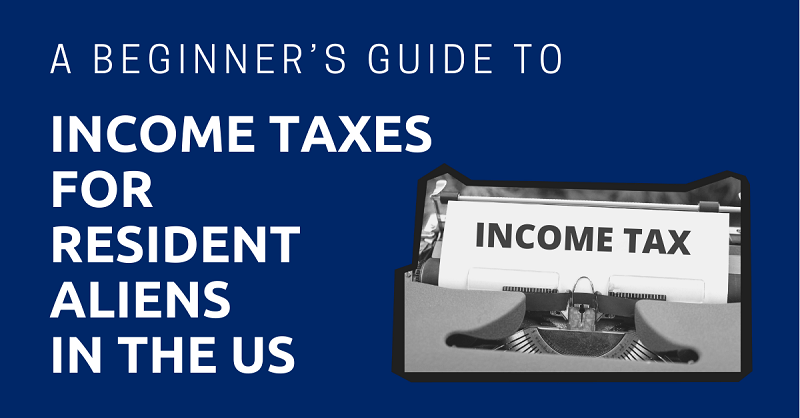
This article will take approximately 20 minutes to read. Don't have the time right now? No worries. Email the ad-free version of the article to yourself and read it later!
You’ve decided to make a change in your life and move to the United States to live and work.
It’s an exciting time — a chance to find a better lifestyle, adopt a new culture, climb the career ladder, and gain invaluable experience.
However, as exciting as moving to the U.S. might be, there’s one thing you have to be mindful of, and that’s federal income taxes.
Everyone in the U.S., at some time or another, will pay income tax, but unlike some countries, the U.S. tax system is complicated to understand.
This article will explain who has to pay income taxes in the U.S., the different residency statuses, and other very useful information to help expats keep on the right side of the Internal Revenue Service (IRS).
Disclaimer: This article may include links to products or services offered by ExpatDen's partners, which give us commissions when you click on them. Although this may influence how they appear in the text, we only recommend solutions that we would use in your situation. Read more in our Advertising Disclosure.
Contents
- Who Has to Pay Income Tax in the U.S.?
- Who are Resident Aliens and Non-Resident Aliens?
- What are the Tax Differences for Residents and Non-Residents?
- Income Tax Rates
- How Do I Get an International Tax Identification Number?
- Filing Your Taxes
- How Do I Get a Tax Return?
- Decreasing Your Income Tax
- Tax Deductions
- Avoid Common Deduction Mistakes
- Foreign Income – Is it Taxable?
- Taxation of Non-Resident Aliens
- Taxes in Your Home Country
- Other Types of Taxes to be Aware Of
- Now, on to You
Who Has to Pay Income Tax in the U.S.?
According to the Internal Revenue Service (IRS), you’re considered a U.S. resident for tax purposes if physically present in the country for at least:
- 31 days during the current year, and
- 183 days during the three-year period that includes the current year and the two years immediately before that, counting:
- all the days you were present in the current year, and
- one-third of the days you were present in the first year before the current year, and one-sixth of the days you were present in the second year before the current year.
If you’re a green card holder, you will automatically be a tax resident in the U.S.
When you’re a U.S. tax resident, you will generally be taxed the same way U.S. citizens are. This means you’re required to pay federal income taxes on your total income no matter where you live in the world.
All that sounds a bit complicated but in short, anyone living in the U.S. with a source of income is required to pay federal income taxes, and depending on the state you live in, state income tax as well.
If you work in the U.S., you’ll have tax deducted by your employer.
However, if your income is below a certain number you don’t have to pay taxes, but you still have to file.
If you’ve paid too much income tax, you’ll get a refund from the IRS, as long as your tax return is filed on time and free of mistakes.
Who are Resident Aliens and Non-Resident Aliens?
In the U.S., the Immigration laws considered you to be an alien if you’re not a U.S. citizen.
The IRS, on the other hand, refers to you as a resident alien or non-resident alien for tax purposes.
A resident alien simply means a U.S. tax resident who doesn’t have U.S. citizenship. On the other hand, if you’re a U.S. citizen and don’t have a tax resident status, you’re a non-resident alien.
What are the Tax Differences for Residents and Non-Residents?
A resident alien is treated the same as a U.S. citizen and must pay federal income taxes on their total income regardless of where it comes from.
Wages, bonuses, tips, gambling winnings – all of it must be reported to the IRS even if you’re outside the U.S. for a whole year and are paid for work done in another country.
If you gain employment in the U.S. and are a resident then your employer will treat you the same as any citizen and deduct taxes according to the current tax rules.
Non-resident aliens only owe tax on income originating from within the U.S.
Your tax commitment is lessened and you’ll file a different tax return rather than the normal 1040. You’ll also be taxed at different rates than resident aliens and citizens.
However, there may also be ways to benefit from various international treaty exemptions.
For example, pensions received from another country may be exempt from U.S. federal income taxes, but should be reviewed by a tax professional to ascertain whether or not they qualify.
Non-residents in the U.S. must follow specific rules when completing tax form W-4.
Non-residents are only allowed to claim single status, even if they’re married with children, and the tax rate for wages is applied at the same graduated rate as that for a U.S. citizen.
If your income is from interest, dividends, royalties, or rents, then this is taxed at a flat rate of 30 percent.
Income Tax Rates
According to information sourced from the IRS for tax year 2020, the top tax rate remains 37 percent for individual single taxpayers with incomes greater than $518,400 ($622,050 for married couples filing jointly).
The other rates are:
- 35 percent for incomes over $207,350 ($414,700 for married couples filing jointly);
- 32 percent for incomes over $163,300 ($326,600 for married couples filing jointly);
- 24 percent for incomes over $85,525 ($171,050 for married couples filing jointly);
- 22 percent for incomes over $40,125 ($80,250 for married couples filing jointly); and
- 12 percent for incomes over $9,875 ($19,750 for married couples filing jointly).
The lowest rate is 10 percent for incomes of single individuals with incomes of $9,875 or less ($19,750 for married couples filing jointly). Married filing separate is the same as filing single.
How Do I Get an International Tax Identification Number?
To legally work in the U.S., you must either get a Social Security number or get an Individual Taxpayer Identification Number (ITIN).
Which one you obtain will depend on your residency status.
You can get a Social Security number if have a visa that allows you to work in the US. Required documents are different based on your visa.
For example, if you have an H-1B visa, you might only need to show your visa stamp. On the other hand, if you’re a student with an F-1 visa, you need a letter from your school and proof of employment.
If you’re a green card holder, you can complete Form SS-5, obtainable from the Social Security Administration’s website, your local Social Security Office, or by calling 1-800-772-1213.
When applying, you must provide proof of your identity, age, and U.S. citizenship or lawful alien status.
Non-resident aliens who cannot get a Social Security number can apply for an ITIN by completing Form W-7 from the IRS website.
The application must be accompanied by documentation proving foreign/alien status and the true identity of the applicant.
You can either mail the paperwork to the address shown on the instructions or deliver it personally if you live near one of the IRS walk-in offices.
Whichever status applies to you, resident or non-resident, you cannot file a tax return without having one of these numbers. The IRS cannot process a tax return without your identifying Social Security number or ITIN.
Filing Your Taxes
Every year, millions of Americans rush to file their taxes before April 15.
However, filing your taxes doesn’t have to put you in panic mode, but if you owe money and your taxes are not filed on time, the IRS will charge you interest and levy a late payment fee.
If you’re due a refund, there are no penalties for filing late.
To file your tax return, you need to gather all the paperwork related to your income and decide if you’re going to use the standard deduction or itemize your expenses.
Let’s take a closer look at how to do it.
Collect All Your Paperwork
You should always have your paperwork on file. Here’s what you regularly need:
- Form W-2 from your employer
- Other earnings or interest received statements 1099 or 1099-INT forms
If you’re going to itemize deductions, you will also need:
- Any mortgage interest statements — form 1098
- Receipts for any charitable donations, medical and business expenses, and you must attach Form Schedule A—Itemized Deductions to your tax return
Choose a Filing Status
If you’re a resident your filing status can be:
- Single
- Married filing jointly
- Married filing separately
- Head of household, or
- Qualifying widow(er)
If you’re a non-resident, you may be able to choose one of the following filing statuses:
- Single
- Married filing separately, or
- Qualifying widow(er)
You normally cannot claim head-of-household status and typically may not file a joint tax return. You must use the single filing status or, if married, file separate tax returns.
However, if a non-resident alien is married to a citizen or resident of the United States, they may be able to file a joint tax return.
Decide whether you’re going to itemize or take the standard deduction. Standard deduction amounts vary depending on age, income, filing status, whether you are blind, and change from year to year.
NOTE: The IRS states that certain taxpayers cannot use the standard deduction, including:
“An individual who was a nonresident alien or a dual-status alien during the year. However, nonresident aliens who are married to a U.S. citizen or resident alien at the end of the year and who choose to be treated as U.S. residents for tax purposes can take the standard deduction.”
Choose How to File Your Tax Returns
Using tax preparation software to complete and e-file your taxes is recommended by the IRS as the easiest and most accurate method of completing and filing your tax return.
One recommended tax software is TurboTax. It helps you file your tax return online through a question and answer process to complete the tax return.
You have an option to do it yourself or ask a tax expert to review your taxes to make sure everything is accurate.
If you’re confident you can complete your tax return yourself, then you can take advantage of the IRS Free File using one of the options shown here.
If Your Return Shows You Owe Money
Then you can visit this IRS website page and make a payment, or if you’re not in a position to pay, then you can apply to make monthly installments.
If You Have Overpaid Income Tax
Then you have the option of having your refund check mailed to you or have the refund amount deposited into your bank account.
How Do I Get a Tax Return?
All the necessary federal tax forms and instructions are available to download from the IRS, and you can either complete them using your computer or print them out and complete them by hand.
You must get the latest version of tax forms and instructions since tax laws can change throughout the year.
You will also need to download your state’s income tax forms, unless you reside in one of the seven states (Alaska, Florida, Nevada, South Dakota, Texas, Washington, and Wyoming) that do not levy a state income tax.
You must use the correct tax form for your particular circumstances.
For example, a U.S. citizen or resident alien must use the federal tax form 1040-U.S., individual income tax returns, plus any schedules that are required.
The most commonly needed schedules attached to Form 1040 are Schedule A – Itemized Deductions, Schedule B – Interest and Ordinary Dividends, and Schedule E – Supplemental Income and Loss.
If you’re over 65, then there is a form 1040-SR specifically for seniors. This is easier to read, has larger type, and has less shaded areas, but it’s optional and still requires the same schedules and attachments as the standard 1040.
Non-residents must use form 1040-NR and not the standard 1040 tax return, plus any related schedules including Estimated Tax – Form 1040-ES(NR) and 1040-NR Schedule A – Itemized Deductions.
Decreasing Your Income Tax
When you’re completing your tax returns, the figure that you should pay attention to is box 11 – “adjusted gross income.” This is the total amount of money you received during the year.
Below is box 12, the amount of your standard or itemized deductions. Line 15, Taxable Income, is the figure that will be used to calculate how much tax you owe the government.
Assuming that your adjusted gross income has been accurately recorded, (the IRS does compare certain items on the tax return with copies they receive from employers, banks, lending institutions, etc.) take an in-depth look at your itemized deductions to decrease the amount of income tax you owe.
This is one area that is quite often overlooked as a source of tax reduction.
Itemized deductions can reduce the amount you owe the IRS and/or state and is for taxpayers whose standard deduction is less than their total deductions, or those who cannot claim the standard deduction.
For the 2020 tax year, for example, the standard deduction for single filers was $12,400, married filing jointly or Qualifying widow(er) was $24,800, and head of household $18,650.’
So, if your deductions are more than the standard deduction, filing Schedule A is a good way to minimize your income tax liability.
Tax Deductions
Deductions are a good way to decrease your taxes.
Here’s a list of the different types of deductions that the IRS allows.
- Medical, dental, and hospital expenses, including:
- Insurance premiums
- Prescription medicines
- Professional fees from doctors
- Therapist fees
- Laboratory fees
- ER and specialists fees
- Taxes that can be deducted include:
- State and local government income tax
- Sales tax
- Real estate and property taxes
- Interest paid on:
- Mortgages
- Premiums on mortgage insurance
- Investments
- Student loans
- Qualified charitable contributions to:
- Churches
- Non-Profit hospitals
- Educational establishments
- National or Local Government
- Public Recreation
- Losses on property, including home, motor vehicles, and theft losses
- Home office expenses
- Expenses related to business activities such as:
- Business licenses
- Travel
- Vehicle expenses
This list is not fully comprehensive and only includes the most common deductions. You can check with the IRS for a complete list of tax deduction.
Avoid Common Deduction Mistakes
If you do decide to itemize your deductions, either by choice, or because it’s the only option you have, then you should avoid making these common errors and prevent raising any questions.
1. Your income doesn’t justify the deductions.
Any deductions should be within a reasonable percentage of your income. If, for example, your deductions total more than 30 percent of your annual income, then you may be leaving yourself open to being audited.
Perhaps you sold your home, cleared out everything, and donated big items to charities. It’s feasible that you have large donations in that year, but rather than listing them all on your Schedule A, spread them over a few years.
2. You have no supporting documents.
Legally, failing to document deductions means you cannot take them. You must keep receipts for any expenses you intend to deduct. The best way is to keep files for each category with bills, receipts, canceled checks, and everything else relating to each deduction.
For example, let’s say you take out a personal loan to pay high medical expenses and are deducting the interest paid on the loan. Keep the doctor’s or hospital’s bills you received and paid with the loan in a file, ready for examination if needed.
3. Deductions fail to meet the minimum percentage of income.
Certain expenses can only be deducted if they are greater than a specific percentage of your income. Only the portion of your medical expenses that exceeds 7.5 percent of your adjusted gross income (AGI) can be deducted.
Let’s say your AGI is $52,000. Multiply 52,000 by .075 and you get 3,900. You must have more than $3,900 in medical expenses to make a deduction.
So if you had a total of $7,000 in medical bills, if you subtract $3,900 from $7,000, you can deduct $3,100.
Foreign Income – Is it Taxable?
It depends on your tax status.
If you’re a resident alien, the IRS states that:
“Generally, you must report all income except income that is exempt from tax by law. Foreign-Source Income: You must report unearned income, such as interest, dividends, and pensions, from sources outside the United States unless exempt by law or a tax treaty. You must also report earned income, such as wages and tips, from sources outside the United States.”
This means that all income received by a U.S. resident is treated as taxable income, regardless of its source, unless it’s specifically excluded or exempt, and it’s taxed at normal graduated rates after allowing for deductions.
Any income tax paid to a foreign country may be used as an itemized deduction or credited towards the U.S. tax liability, but the income type must match in both cases.
Taxation of Non-Resident Aliens
Non-resident aliens are taxed differently on income received from a U.S. source that has no connection with a U.S. business or trade.
It’s taxed at a flat 30 percent tax rate and no deductions are permitted. Examples of this type of income include periodic annual income, dividends, royalties, and rents.
Almost all tax treaties either eliminate or greatly reduce tax liability on foreign income received by a non-resident alien such as dividends, royalties, or interest provided that the income is not connected in any way with a U.S. business or trade.
For example, these would include compensation from a foreign employer or pensions from former employers.
Since the U.S. tax system and related tax treaties can be quite complicated, it would be wise to seek the advice of a tax professional who has experience in dealing with multi-country income and taxes.
When filing your tax returns, whether it’s form 1040 in the case of a resident or form 1040-NR for non-residents, the income amounts and any tax already paid, must be entered in the correct boxes to ensure that the IRS can process your tax returns with no problems.
Taxes in Your Home Country
Living and filing tax returns in the U.S. doesn’t mean you’re exempt from filing a tax return in your home country.
In fact, certain criteria must be met to avoid issues.
Even if you’re no longer a resident in your home country (there are rules that determine residency status) and have no source of income from home, then you’ll have to pay income tax on this income.
If you’re entitled to take deductions or personal allowances from your income total, then you’ll only pay taxes on the balance.
Each country has different tax systems, but if we use the U.K. as an example, income includes pensions, rental income, wages and salaries, and interest from saving accounts – and are all subject to income tax.
Since the U.S. has a double-taxation agreement with the U.K. you’ll be able to claim U.K. tax relief to prevent being double-taxed.
Here’s a complete list of countries that have a tax treaty with the U.S.
Again, to prevent being levied fines or penalties by your home country for not filing a tax return or filing late, get a tax professional to help with your taxes and submit your tax returns to your home country.
Other Types of Taxes to be Aware Of
The U.S. has many other taxes that you should be aware of in addition to income tax. Depending on which state you live in, residents may be subject to payroll, local, and state taxes.
Payroll Taxes
Not only does every employee have federal income tax deducted from their paycheck, but an employer is obligated to also deduct Social Security and Medicare taxes and in the majority of the 50 States, state and local personal income tax.
The Social Security tax (FICA) is made up of two parts:
- Old-age, Survivors, and Disability Insurance (OASDI)
- Medicare
The current rates for OASDI and Medicare are 6.2 percent and 1.45 percent respectively. There is also an additional 0.9 percent Medicare tax levied to the employee.
State Income Taxes
As with the federal income tax system, state income tax is complex, and only eight of the 50 states don’t impose state income tax.
Of the states that tax individual income, one state – New Hampshire – taxes only interest and dividend income.
Nine states tax at a single rate applicable to all taxable income, with the rest taxing on a graduated-rate basis, with the tax brackets varying from state to state.
Additionally, if you live in one state and work in another state, which is the case for a lot of people in New York, New Jersey, and Connecticut (tri-state area), you’ll have to pay state income tax in both states – the state you live in and the state you work in.
Local Taxes
There are 14 states that grant cities, counties, and local jurisdictions the right to impose individual income tax over and above the state and federal income tax.
Again, depending on where you live, you could end up paying income tax to not only the government but to the state, county, and city.
Now, on to You
As you can see, the U.S. tax system is complicated, at times mind-blowing, and the IRS’s authority over U.S. citizens, resident, and non-resident aliens is wide and long-reaching.
Whether you intend to make the U.S. your new permanent home, or you’re only in the country temporarily, keeping on the right side of the government should be high on your list of priorities.
The taxes you’ll pay are inevitable. Everyone has to file income tax returns at some time during their life in the U.S. How you file depends on your tax status – citizen, resident alien, or non-resident alien.
With that said, whichever method is right for you, keep accurate records, check and re-check calculations on tax returns if you don’t use tax software. And remember, it’s your responsibility to calculate the amount of tax due and there are penalties if you get it wrong.







